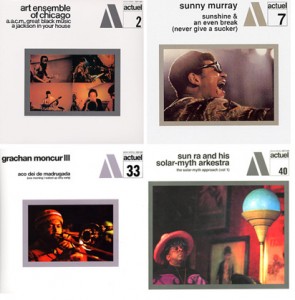Story
Stop Smiling
August 2008
Link

Jazz history is filled with examples of Europeans embracing underappreciated American artists. But the circumstances surrounding BYG/Actuel, a short-lived French label dedicated to the late Sixties avant-garde, set it apart. The label’s seminal releases — from trumpeter Don Cherry’s contemplative duets to saxophonist Archie Shepp’s sultry Blasé to sessions led by lesser-known players like Clifford Thornton — catalog a collective achievement in sound from a roster of mostly expatriates.
“It’s a total unraveling of sound,” says Jeff Jackson, a critic and co-author of the blog Destination: Out. “You get three vectors coming into one place — back to the source African music, European high gloss cultural appreciation and American jazz.”
The Parisian label was a spin-off of Actuel magazine, founded in 1968 by editor, producer and occasional drummer Claude Delcloo. Born out of the student movement, the edgy arts publication attracted the attention of photographer Jacques Bisceglia, Jean-Luc Young and Jean Georgakarakos (later just Karakos), hence the label’s title, BYG (though Bisceglia maintains the “B” comes from an investor named Boroseau).
His initial or not, Bisceglia, a veteran jazz fan, was crucial in assembling talent. During a July 1969 trip to the Pan-African Festival in Algiers — where Nina Simone and Stokely Carmichael crossed orbits — Bisceglia recorded a transcendent performance featuring nomadic native drummers jamming with Archie Shepp and an all-star American ensemble. All soon traveled to Paris. Bisceglia contacted Chicagoan Steve McCall, a drummer and member of the Association for the Advancement of Creative Musicians (AACM). Some of McCall’s friends and fellow musicians — a theatrical, groundbreaking group labeled the Art Ensemble of Chicago by a French promoter — recorded three discs for BYG.
“People said we were recording artists people didn’t want to hear,” says Bisceglia. “We didn’t realize we were making historical records.”
In contrast to New York, where opportunities were drying up, Paris proved a creative mecca. BYG started recording in August 1969 at both Studio Davout and Studio Ossian in Montmartre, focusing on experimentation, with artists rotating ensembles and taking bold risks. According to pianist Dave Burrell, who played alongside Shepp and others and led two BYG sessions, the atmosphere was the antithesis of “New York uptightness” — you could sip wine to relax, women brought in fried chicken for lunch, and many of the musicians mixed after hours at Storyville, a Latin Quarter bar Bisceglia managed.
“We were so high off of the experience of playing in Algeria that Paris seemed like dessert after the main course,” says Burrell. “It was like going to a big party every morning. Who are you going to record with today?”
In the end, the feeling of energy and emancipation was unsustainable. In October 1969, BYG spent profusely to fund the Festival Actuel, a nexus of outré music featuring label-affiliated free jazz, Pink Floyd and Captain Beefheart. Recording slowed down and by 1973, mistakes and disorganization led to bankruptcy. Karakos, who later ran Celluloid Records and helped promote the “Lambada” craze in 1989, sold his shares to Young, who now runs the Charly label. Claims of financial impropriety and shortchanging artists have dogged the label and subsequent reissues — Bisceglia himself has sued Young multiple times. But nothing diminishes the label’s recorded legacy, injecting optimism into the avant-garde.
“I think about painters struggling, then their work gets celebrated,” says Burrell. “The boom in Paris gave us hope we could be appreciated. It helped us get that satisfaction.”